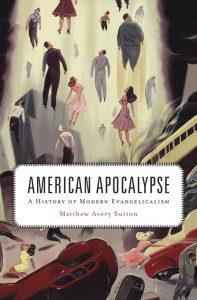Christians have no good reason to believe Jesus is coming soon.
Okay, in the final chapter of John’s Apocalypse, Jesus himself says, “See, I am coming soon” (I prefer the King James Version’s “Behold, I come quickly”). But let’s face it, “soon” and “quickly” do not usually mean after two millennia.
Indeed, a surface reading of the New Testament suggests that we need to approach Jesus’s statements about his imminent return with great caution. In the synoptic gospels, Jesus informs that “this generation will certainly not pass away until all these things have happened,” including “the Son of Man coming in clouds with great power and glory.” If memory serves me, in the Gospel of John Jesus predicts his return, but he does not say this will take place soon or with an accompanying cataclysm.
Many first-century Christians expected the imminent return of Jesus. The Apostle Paul, in a letter written to the church at Thessalonica in ca. 50 C.E., seems to anticipate that he and other Christians will live to “meet the Lord in the air” when he descends from heaven in the clouds. While the Book of Revelation’s complex symbolism eschews any specific timetable for its prophecies, it emphasizes that they will “shortly come to pass” and that the “time is at hand.”
Not surprisingly, most Christians adjusted their expectations when Christ did not return as predicted. Some New Testament books place his return in a more distant future. A fair number of early Christians hesitated to accept John of Patmos’s visions as scripture.
Despite this legacy of disappointment, over the centuries many Christians have concluded that the Second Coming and the millennium are imminent. The Montanists, who brought forth their prophecies in the second half of the second century, believed that the New Jerusalem would descend on the Asian Minor city of Phrygia.
Various millennial movements arose in medieval Europe. Most ended badly. The early-fifteenth-century Taborites, for instance, predicted that Jesus would return on a mountain south of Prague (which they renamed Mount Tabor). He did not, and German and Magyar armies crushed the movement in 1434. Fortunately, the early-sixteeenth-century Anabaptists at Münster were wrong about the timing and type of the millennium. Luther, by the way, was initially very cool toward the Book of Revelation but later concluded that he was living in the end times.
If we move to early-nineteenth-century America, many postmillennialists and premillenialists believed that the Second Coming was nigh. William Miller was embarrassingly wrong. Early Latter-day Saints observed Miller’s errors and avoided setting such specific and imminent dates, but countless Mormon predictions that Jesus Christ would return within several decades also proved wrong.
Wrong, wrong, wrong. Undeterred by or oblivious to eighteen centuries of Christian history, a substantial segment of American fundamentalists and, later, evangelicals, believed that they were living in the end times and would soon see the return of their Savior. Matthew Sutton, in American Apocalypse, tells this story boldly and eloquently. Premillennial apocalypticism was one central impulse of this segment of American Protestantism.
 These premillennialists were not wrong about everything. They deserved to make some hay after the dreams of progressivism and pacifism faltered so badly with the First World War. And one can readily see why so many Americans embraced their predictions in the decades following the Second World War. If I had been alive in the 1940s, I would definitely considered the creation of the modern state of Israel a harbinger of Christ’s return. And premillennialism, rather than an excuse for passivity, spurred evangelicals toward evangelistic work and other forms of activism.
These premillennialists were not wrong about everything. They deserved to make some hay after the dreams of progressivism and pacifism faltered so badly with the First World War. And one can readily see why so many Americans embraced their predictions in the decades following the Second World War. If I had been alive in the 1940s, I would definitely considered the creation of the modern state of Israel a harbinger of Christ’s return. And premillennialism, rather than an excuse for passivity, spurred evangelicals toward evangelistic work and other forms of activism.
If not wrong about everything, however, most of these evangelical prophets were badly wrong about what mattered most to them. “If the return of Christ was not around the next corner,” Sutton writes, “it was always behind the corner after that.” Except that it wasn’t.
I do not have ready answers for how to justify Jesus’s promise that he was coming soon (let alone within a generation) with his long delay. Nor do I recommend that believers discard a central doctrine of the faith, that Jesus will come again to judge the living and the dead. The knowledge of Christ’s Second Coming comforts those who suffer in this world (which is, ultimately, all of us) that God will one day restore His creation and allow all of his Saints to live in a city with the “tree of life,” the tree Adam and Eve could not access after their expulsion from Eden. And the Second Coming, coupled with its promises of divine judgment, reminds us that this world is not our final home and not the place in which we should lay up our treasures. “Even so,” we might pray, “come, Lord Jesus.”
But soon? If two centuries of Christian history are any guide, probably not. Better to simply be ready than over-eager.












